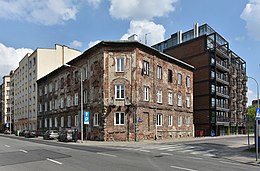
Back Gentrifikasie Afrikaans استطباق Arabic Xentrificación AST Джентрификация Bulgarian Džentrifikacija BS Gentrificació Catalan Gentrifikace Czech Boneddigeiddio Welsh Gentrificering Danish Gentrifizierung German



Gentrification is the process of neighborhood demographic change through the influx of more affluent residents and corporate welfare programs like rezoning and tax abatements.[1][2] There is no agreed-upon definition of gentrification, but in public discourse it has been used to describe a wide array of phenomena, usually acquiring a pejorative connotation.[3]
Gentrification is a common and controversial topic in urban politics and planning. It often raises the cost of living in a neighborhood, changing both the demographic composition and displacing incumbent residents.[1] Gentrification is more likely when there is an undersupply of housing and rising home values in a metropolitan area.[4]
When the gentrification process begins is unclear. Prior to people with higher incomes moving in from neighboring cities, towns, or neighborhoods there may be increased cultural and financial investments in a community by artists, musicians and local community activists. The resulting cultural transformation from such community-based activity can help to lower crime rates and encourage economic development by small local businesses. Often such creative, local solutions which stabilize a struggling district can be mistaken for the gentrification that follows, despite lowering attrition rates among disadvantaged populations.[5] A third wave of change occurs when corporate developers move into an area, often with sponsorship from central city governments. The resulting incursion of high rises and large chain stores can lead to a steep rise in both the cost of living and attrition rates among disadvantaged populations.[5]
- ^ a b Finio, Nicholas (2022). "Measurement and Definition of Gentrification in Urban Studies and Planning". Journal of Planning Literature. 37 (2): 249–264. doi:10.1177/08854122211051603. ISSN 0885-4122.
- ^ "Gentrification". Dictionary.com.Lees, Slater & Wyly 2010[page needed] define gentrification as "the transformation of a working-class or vacant area of the central city to a middle class residential and/or commercial use".
- ^ Demsas, Jerusalem (5 September 2021). "What we talk about when we talk about gentrification". Vox.
- ^ Murphy, Daniel (2024). "Housing cycles and gentrification". Journal of Monetary Economics. 144. doi:10.1016/j.jmoneco.2024.01.003. ISSN 0304-3932.
- ^ a b "Gentrification and Displacement: New York City in the 1990s" by Lance Freeman and Frank Braconi, Journal of the American Planning Association, Vol. 70, 2004, Issue 1, Pages 39–52. Published online November 26, 2007.
© MMXXIII Rich X Search. We shall prevail. All rights reserved. Rich X Search